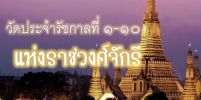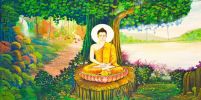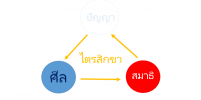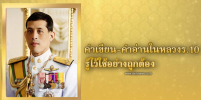Buddhism EP. 05 : What is the Real Heart of Buddhism ?
Buddhism is realistic, the idea of cause and effect is the real heart of Buddhism and is at the heart of the “Four Noble Truths”. http://winne.ws/n24674
Let’s study together thru the conversation of the students who really need to know about “Buddhism”
Tim : Rob, have you finished reading these books ?
Rob : Yes. I will give them back to you
so that I can borrow some new ones.
Tim : All right. Please choose what you like.
Rob : Tim, what is the real heart of Buddhism ?
I wondered why I had not found mention of
the heart of Buddhism in these books.
Tim : Actually, the Buddha did not state
Which one of His teachings was
the heart of Buddhism.
Therefore, several Buddhist teachings,
e.g. the Four Noble Truths,
The Three Universal Characteristics,
Dependent Origination,
the Three Admonitions and Heedfulness
have been considered by Buddhist scholars
to be the heart of Buddhism.
However, the Buddha has said that
it is because we fail to understand
the Four Noble Truths, that we have continued
so long in the cycle of birth and death.
In addition, in this first sermon given to the five ascetics,
The Buddha spoke primarily about the Middle Path
and the Four Noble truths. These indicate
how important the Four Noble Truths are.
Apparently, the Buddha never delivered
this sermon again except for explain it
in greater detail and in different ways.
Rob : So you think that the Four Noble Truths
are the heart of Buddhism.
Tim : Yes, of course.
Rob : What do they include ?
Tim : The Four Noble Truths include
the truth of suffering,
the truth of the cause of suffering,
the truth of end of suffering, and
the truth of path leading to the end of suffering.
Rob : I am wondering why Buddhism begins with
the truth of suffering. It sounds so pessimistic !
Tim : Well, suppose I get seriously ill, I may say to you,
“Oh, why do I have to face this suffering?”
Will you think that I am pessimistic ?
Rob : No, not at all. You speak the truth.
Illness always causes a lot of suffering.
Tim : Who can avoid illness ?
Who can avoid aging ?
Who can avoid sorrow and death ?
No one can avoid suffering.
Consequently, I would say that Buddhism is
neither pessimistic nor optimistic but realistic !
Rob : That’s true. The longer we continue in
this cycle of existence, the more we face suffering.
Tim : Actually, the Buddha has not stated only
the truth of suffering, He has also pointed out that
the great cause of suffering is craving.
Finally, He has taught how to remove craving.
When craving has been removed, then suffering ends.
If we take the Four Noble Truths into consideration,
we can see that the main concept of this sermon is
the relationship between cause and effect :
the second truth is the cause of the first truth,
while the fourth is the cause of the third.
Rob : The first and the third truths are the effects of
the second and the fourth truths respectively.
Tim : That’s right. Now, Rob, do you see that the idea of
cause and effect is the real heart of Buddhism and
is at the heart of the “Four Noble Truths” ?
Rob : Yes, I agree with your analysis.
Thank you very much, Tim.
Tim : It has been my pleasure.
Thanks & regards : AJ S.Srisopa (Cr. All Dhamma teachers) & TCDC Thailand












